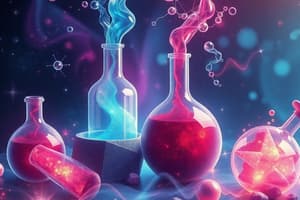Podcast
Questions and Answers
Which statement accurately describes the First Law of Thermodynamics?
Which statement accurately describes the First Law of Thermodynamics?
- Energy can be created under certain conditions.
- The total energy of an isolated system can decrease.
- Heat and work are both forms of potential energy.
- Energy can only be transformed and not created or destroyed. (correct)
What is a requirement for a process to be considered reversible?
What is a requirement for a process to be considered reversible?
- The forward and reverse reaction rates must differ.
- The system must constantly absorb heat.
- No energy must be dissipated during the process. (correct)
- The process must result in an increase in entropy.
At equilibrium, which of the following statements is true?
At equilibrium, which of the following statements is true?
- The rate of the forward reaction is greater than the reverse.
- The rates of the forward and reverse reactions are equal. (correct)
- The total entropy of the system can decrease.
- The system achieves maximum energy for its surroundings.
What does standard enthalpy change (ΔH°) represent for a substance?
What does standard enthalpy change (ΔH°) represent for a substance?
How is the change in enthalpy (ΔH) related to temperature change (ΔT) and heat capacity (C)?
How is the change in enthalpy (ΔH) related to temperature change (ΔT) and heat capacity (C)?
Flashcards are hidden until you start studying
Study Notes
Physical Chemistry
- Studies the interrelationship between the physical properties of substances and their chemical behaviors.
- Key concepts include thermodynamics, kinetics, quantum chemistry, and statistical mechanics.
- Focuses on energy changes and interactions during chemical reactions.
First Law of Thermodynamics
- States that energy cannot be created or destroyed, only transformed.
- Mathematically expressed as ΔU = Q - W:
- ΔU: Change in internal energy
- Q: Heat added to the system
- W: Work done by the system
- Implications include conservation of energy in chemical processes.
Reversibility in Energetics
- A process is reversible if it can return to its initial state without any net change in the universe.
- Requires that no energy is dissipated (e.g., no friction or resistive forces) during the process.
- In reality, most processes are irreversible due to entropy increases.
Position of Equilibrium and Maximizing Global Entropy
- Equilibrium occurs when the rates of the forward and reverse reactions are equal.
- The system at equilibrium has reached a state of minimum energy for its surroundings and maximum entropy for itself.
- The Second Law of Thermodynamics states that the total entropy of an isolated system can never decrease.
Enthalpy Standard States
- Standard enthalpy (ΔH°) is the enthalpy change when a substance is formed from its elements at standard conditions (1 atm, 25°C).
- Standard states for substances involve their pure form at the defined temperature and pressure.
- Crucial for calculating reaction enthalpies using Hess's Law.
Enthalpy Changes with Temperature
- Enthalpy changes are temperature-dependent; as temperature increases, substances generally absorb more heat.
- The heat capacity (C) is crucial for calculating enthalpy changes with temperature:
- ΔH = C × ΔT
- For most substances, different forms (solid, liquid, gas) have distinct heat capacities, influencing their enthalpy changes.
Physical Chemistry
- Explores the connection between the physical attributes of substances and their chemical behavior.
- Key areas of study include thermodynamics, kinetics, quantum chemistry, and statistical mechanics.
- Focuses on energy changes and interactions during chemical reactions.
First Law of Thermodynamics
- Energy is neither created nor destroyed, only transformed.
- Can be expressed mathematically as ΔU = Q - W.
- ΔU: Change in internal energy
- Q: Heat added to the system
- W: Work done by the system.
- Implies conservation of energy in chemical processes.
Reversibility in Energetics
- A reversible process returns to its starting state with no net change in the universe.
- Requires no energy dissipation (e.g., friction or resistive forces) during the process.
- Most processes are irreversible due to increasing entropy.
Position of Equilibrium and Maximizing Global Entropy
- Equilibrium occurs when forward and reverse reaction rates are equal.
- The equilibrium system reaches a state of minimum energy for its surroundings and maximum entropy for itself.
- The Second Law of Thermodynamics states that an isolated system's total entropy cannot decrease.
Enthalpy Standard States
- Standard enthalpy (ΔH°) is the enthalpy change when a substance is formed from its elements under standard conditions (1 atm, 25°C).
- Standard states for substances involve their pure form at the defined temperature and pressure.
- Crucial for calculating reaction enthalpies using Hess's Law.
Enthalpy Changes with Temperature
- Enthalpy changes are temperature-dependent; higher temperatures usually mean substances absorb more heat.
- Heat capacity (C) is critical for calculating enthalpy changes with temperature:
- ΔH = C × ΔT
- Different states (solid, liquid, gas) typically have distinct heat capacities, impacting their enthalpy changes.
Studying That Suits You
Use AI to generate personalized quizzes and flashcards to suit your learning preferences.




